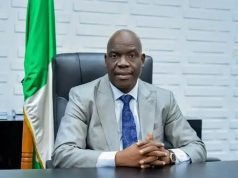By David Onmeje
The only redeeming aspect of a story written by Wall Street Journal about secret soldiers’ graves in Madagali, Borno state is the line that read “The Nigerian military and the presidency didn’t respond to requests for comment on the war, casualties and the secret cemeteries.”
It would have taken a nation led by a people consumed by an inferiority complex to dignify the report, “Secret Military Cemetery Conceals Toll of Islamist Insurgency in Nigeria,” with a response. Expressing any opinion or stating the government side to the story would have amounted to validating the lies that WSJ is desirous of offloading on the world. It would have also used such response to negotiate a higher payout from its client(s).
Understandably, the refusal to comment on the story did not stop its publication. It could not have anyway. But it is time that someone, who else but a bullied Nigeria, put the racist publication in its place. Perhaps it will now be clear to the world that what they regard as an intentional news title is nothing but a deep state operation, that has branched into offering mercenary consultancy to disgruntled opposition members in any country of interest. Another thing that has become clearer is the tendency for WSJ to pick up issues that are already in the public domain and cast them in a new light to satisfy the agenda it is in pursuit of, something the President of the United States, Donald Trump, will effectively declare as “fake news”.
Possibly in a bid to do maximum damage, WSJ turned the whole story upside down. It created the impression that the remains in the 1000 graves were those of soldiers that were killed yesterday or last week or last month or even last year, when in reality some of the bodies predated the Buhari administration. In reality, the cemetery holds remains dating from the Goodluck Jonathan era when Boko Haram was a big issue. The publication came off as intended to cause mischief, a counter to the Presidency’s declaration of the defeat of Boko Haram a few days prior. It is also a deliberate plan to derail democracy in Nigeria by painting the government bad to incite citizens.
It gets even worse. Not only does the newspaper act as a willing catalyst for neocon illegitimate intervention to disrupt sovereign states across the world it has now also become a paid-hire-propaganda mill, buyable by willing and corrupt despots and in the case of Nigeria – a rotten opposition. The obscene romance between WSJ and Atiku Abubakar, who was one of the opposition candidates on the platform of the People’s Democratic Party (PDP), is well known. This explains the barrage of negative stories that the publication ran around the Nigerian elections.
In the period leading to the election, the reputation of Atiku doling out funds to foreign hitmen is well known and availability of money was no problem for the man whose sole political credentials center around the state resources he was able to corner to himself when he held office as Nigeria’s Vice President. Curiously, not much of the malignant stories written by WSJ referenced this sleazy character who would later become its largest patron in Nigeria.
The report about the military graves was allegedly done at the instance of Atiku who, running short of things to blackmail the incumbent government with, is in desperate need of something to keep glimpses of his torpedoed ambition in public consciousness. As fictitious as this allegation is, the speed with which Atiku jumped on the report to react to the report of the graves gave the game away. What is WSJ not telling it’s readers?
WSJ painted the picture of a country losing its war against ISWAP – Islamic State West Africa Province terrorists without acknowledging its role or contributions towards the creation of the worst threat to humanity – jihadi terrorists. The rise of the Islamic State cannot be accounted for without the misguided war that destabilized Iraq. That war, based on a non-existent weapons of mass destruction, would not have happened without the input of ab evil entity like WSJ. An article in the World Socialist Web Site, “The Wall Street Journal and the occupation of Iraq,” detailed how the Journal manipulated the situation to get its war. Unfortunately, there is no record of WSJ suffering consequences for such lies, which explains why it continues to implement such destabilization agenda against other countries through its reports.
The instability occasioned by that war provided the fertile ground for the Islamic State to emerge and thrive. It played a similar role in Syria in pursuit of overthrowing Bashir al-Assad as president of Syria, which helped ISIS to spread faster than necessary. This is the terror organization that fled the Middle East, in the wake of a Russian backed onslaught, and relocated to the Lake Chad Basin to replace a Boko Haram that had succumbed to punishing operations of the Nigerian military.
It is interesting how WSJ was able to find thousands of secret graves holding the remains of Nigerian troops in a publicly known cemetery but is too limited to report the relationship between its atrocious activities in the Middle East and ISIS’ infiltration of the north east of Nigeria. It found corruption and secrecy in Nigeria but somehow remains unable to expose the financial network that had kept ISWAP well financed and equipped with modern weaponry. Somehow, the ethical responsibility to report in a way that guarantees the marshalling of resources to combat terrorism in Nigeria eluded this so called reputable organization.
It discarded all these responsibilities and instead pitched tent with the opposition in Nigeria, which may just be complicit in strengthening the terrorists to be resistant against a sovereign state. It engaged in acts that are inconceivable in its own country of origin, for no news organization in the United States will dare report terrorism in a manner that gives advantage to the terrorist. Such media outfit will automatically consign itself to the status of a pariah. But that is exactly what WSJ has done in Nigeria, ostensibly because it considers itself beyond the reach of the country in terms of repercussions.
Thankfully for Nigeria and the present administration, consequences for WSJ’s irresponsible acts do not have to come from them. The loss of credibility that will naturally follow its romance with the opposition in Nigeria will cause it more damage than the hoax about Saddam Hussein’s non-existent weapons of mass destruction did. When the true extent of collusion between WSJ and the PDP/Atiku become known to its readers they will realize that they have been conned out of the money they pay to subscribe for WSJ’s jaundiced articles. Its articles and news stories about Nigeria in the past two years re being paid for by the opposition, which sadly is also being jobbed by a WSJ that has not been able to deliver on unsettling the Buhari administration.
What the WSJ can do under the circumstances is to make fair disclosure to Atiku Abubakar and the PDP that it is not in a position to reverse their jaded fortune; each lie it has published to create talking points for the opposition come with shelf life that lasted less than three days because they are short on facts. Such truthfulness will help Atiku realize the futility of throwing more money after bad money in the hope of overthrowing the government like he has been trying to. But a publication that is dubious to the point of misleading its readers and misleading even nations will never summon the decency to stop scamming its client, which is why the Nigerian opposition will remain jaded for as long as it relies on fraudulent enterprise like WSJ to unseat the government for it instead of eschewing corruption and seeking the forgiveness of the Nigerian masses.
Onmeje is a public affairs analyst and wrote this piece from the United Kingdom.








